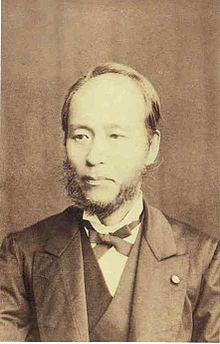Terashima Munenori | |
|---|---|
| 寺島 宗則 | |
 Portrait of Count Terashima Munenori by Kuroda Seiki | |
| 3rd Chairman of the Chamber of Elders | |
| In office 21 October 1881 – 13 July 1882 | |
| Monarch | Emperor Meiji |
| 4th Foreign Minister of Japan | |
| In office 18 October 1873 – 10 September 1879 | |
| Personal details | |
| Born | June 21, 1832 Akune, Kagoshima, Japan |
| Died | June 21, 1893 (aged 61) |
| Occupation | Politician, Diplomat |
Count Terashima Munenori (寺島 宗則, June 21, 1832 – June 6, 1893) was a Japanese politician and diplomat during the Meiji period. He served as the 3rd Chairman of the Chamber of Elders and Japan's 4th Foreign Minister.
Early life[edit]
Terashima was born to a samurai family in Satsuma Domain (in what is now part of Akune, Kagoshima Prefecture). He studied rangaku and was appointed as a physician to Satsuma daimyō Shimazu Nariakira. In 1862, he was chosen as a member of the group of students selected by the Tokugawa bakufu to study at the University College London in Great Britain. He also visited France, the Netherlands, Belgium, Russia and Portugal. He returned to Japan in 1863, and participated in the defense of Satsuma during the Anglo-Satsuma War.
Meiji bureaucrat[edit]

After the Meiji Restoration, Terashima was appointed a san'yo (junior councilor) in the new Meiji government. In 1873, he was appointed foreign minister, and negotiated the Treaty of Saint Petersburg (1875), which fixed the national boundaries between Japan and the Russian Empire. His efforts to re-negotiate the unequal treaties with the United States failed at the last minute due to British opposition. Terashima was also responsible for the negotiations during the Maria Luz Incident involving a Peruvian ship carrying indentured labor Chinese laborers stopping in Japan.
As Governor of Kanagawa Prefecture, he was responsible for connecting Tokyo and Yokohama by telegraph in 1868.
He later served in the Genrōin (Chamber of Elders), and as the chairman of Genrōin between 1881 and 1882. In 1891, he became vice president of the Privy Council.
References[edit]
- Auslin, Michael R. (2004). Negotiating with Imperialism: The Unequal Treaties and the Culture of Japanese Diplomacy. Cambridge: Harvard University Press. ISBN 978-0-674-01521-0; OCLC 56493769
- Cobbing, Andrew. The Japanese Discovery of Victorian Britain. RoutledgeCurzon, London, 1998. ISBN 978-1-873410-81-3
- Jansen, Marius B. (2000). The Making of Modern Japan. Cambridge: Harvard University Press. ISBN 9780674003347; OCLC 44090600
- Keene, Donald. (2002). Emperor of Japan: Meiji and His World, 1852-1912. New York: Columbia University Press. ISBN 978-0-231-12340-2; OCLC 46731178